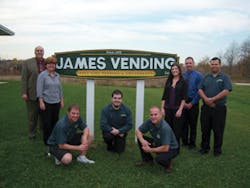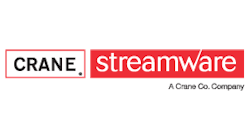The economy may be in recession, but don’t tell anyone at James Vending Inc. The tight-knit team is too busy chasing new business and delivering the high quality service that state-of-the-art equipment can provide to pay attention to bad news.
Spend a day with the youthful team in Lemont Furnace, Pa. outside of Pittsburgh, and you’ll get a new perspective on what’s happening in today’s challenging economy. That’s because the highly motivated staff has learned that the best products and equipment available have given automatic merchandising a great future.
James Vending, founded in 1973, has experienced exceptional growth since opening its 33,000-square-foot facility two years ago. Under the direction of company founder Jesse J. Risha, the $3 million building was designed to enable operations to function seamlessly. The youthful staff go about their functions, loading 26-foot trucks that pull up to five loading docks, organizing inventory in the massive warehouse, and attending to sales and customer relations.
The custom built facility has enabled Risha’s crew to introduce hundreds of new machines that feature LCD display screens, bill recyclers, and expanded product capacity. These innovations, supported by a highly motivated staff, have resulted in a higher level of service to the area’s businesses.
For Risha, the business has been a constant learning experience that has resulted in a team of managers that share his enthusiasm.
HUMBLE BEGINNINGS
Risha’s journey began in 1971, when he bought a pool hall with borrowed money in his native Uniontown, Pa. while attending college. He expanded into amusement and cigarette machine vending, launching the vending business under his middle name, James, in 1973.
Risha operated the business part-time while he held other jobs before devoting all of his time to the business in 1975.
In the early 1980s, glassfront vending machines were introduced, and Risha recognized the consumer appeal of these merchandisers. It was then that he decided to focus on full-line vending, which he saw as more profitable than amusement machines.
By 1999, he had six full-line routes and made a critical decision to invest in frozen food machines and a dedicated frozen food route. The refrigerated food business was unprofitable, and Risha did not have the volume to provide fresh food competitively.
The dedicated food truck with a built-in freezer proved economical. Food manufacturers were offering better quality precooked products with more variety, and Risha was able to win accounts offering frozen food machines.
Risha acknowledges that not having fresh food puts the company at a disadvantage at some accounts, but he has been able to counter that frozen machines on average carry more food; many refrigerated machines carry a lot of beverages.
“Frozen really is the way to go,” said Risha.
COMPANY CORNERSTONE: MODERN EQUIPMENT
Risha also recognized the importance of using state-of-the-art equipment. An early convert to glassfronts, he has followed the development of glassfront machines in all product categories. The BevMax3 from Crane Merchandising Systems (CMS) has helped the company take advantage of changing cold drink tastes. “They (customers) don’t mind putting a bit more money in a nicer machine,” he said.
Justin Packrone, route supervisor, said the “double gate” on the BevMax3 makes it easy to load different types of packages without using a spacer.
The BevMax3 is easier to load than earlier glassfront beverage machines, Risha said, and has greater capacity. The company owns half of the beverage machines it operates, which allows them the freedom to merchandise the best selling products.
When 20-ounce bottles became available in the mid 1990s, Risha recognized the opportunity to maximize sales and was one of the first operators in the area to almost eliminate canned soda. The 20-ounce bottles have allowed the company to meet the growing demand for non-carbonated drinks in recent years.
The beverage bottlers that provide full service vending remain a challenge since they keep prices low, but Risha said they are beginning to retreat from vending.
After witnessing the success of the glassfront beverage machine, the team was quick to welcome CMS’s expanded glassfront candy/snack machine, the Merchant Six, which has an LCD display screen (for promotions), a bill recycler option, 6- and 7-shelf configuration capability, and a larger keypad that offers lighted keys to make purchasing easier.
This past year, James Vending placed 40 of these machines as part of a pilot test and witnessed a 40 percent sales improvement. The 58 facings include some higher priced items, including bigger gum packs and some shelf stable meal cups. “The possibilities are just endless with those machines,” said Bob Jobes, company manager.
The bill recycler, which pays back $5 and $10 bills and dollar coins, has been a great asset, Packrone said. Customers also like the big “okay” key at the bottom of the keypad that confirms the selection.
The company has not yet expanded into cashless, but it is considering this in some hotel accounts. It also makes sense in locations where the account wants to load value on employee cards.
“With the new equipment, we can set our goals higher,” Packrone said. “We’re trying to set a precedent that prices have to be high,” added Risha.
The expanded capacity machines have allowed the company to consolidate some routes. The company has found electronic locks helpful in preventing vandalism, as has installing metal hoods on bill acceptors.
KEY TO GROWTH: EMPLOYEES
Risha has long recognized the need for highly dedicated employees.
In 2000, he hired Packrone as a driver. Packrone immediately excelled. He learned loading techniques that allowed him to fill 210 cases of soda in one day. He has been promoted to route supervisor, but still runs the biggest route himself.
Risha also decided he needed a dedicated sales manager. He went through two sales people before hiring Don Havens in 2000. Havens brought sales experience in another service industry.
Havens, whose title is vice president of customer service and sales, is responsible for meeting regularly with existing customers in addition to new sales. This has proven important for improving account retention. “They (customers) get to see someone with a little authority,” said Jobes.
Havens works in concert with the drivers, who are the “front line” sales people at the accounts.
Risha said Havens has been especially helpful in negotiating price increases, which is more important than ever. The company sends out letters before prices are raised, and Havens makes it a point to explain to accounts why the increases are needed. “We don’t just walk in and raise prices,” Jobes explained.
“My position is to build relationships with customers,” Havens said. “That’s one area where our company has a big advantage.”
In addition to soliciting new accounts, Havens is active in various chambers of commerce and other organizations. “I really believe business is a lot about networking,”
Havens said.
The management group — consisting of Risha,
Packrone, Havens, Jobes, technician manager Joe Hackney and Risha’s son, Tofy, the assistant manager — came up with an employee screening process that has worked well. The company only hires about one out of every 50 applicants. In return, the company offers a career opportunity. It offers full medical benefits, a retirement plan, and a
15 percent profit sharing contribution.
Working with their accountant and lawyer, the management group also developed an employee handbook that describes company policies.
Packrone spends two weeks training every new driver. The drivers are then sent out on 12-hour trips to see if they have the stamina needed.
Drivers are taught how to trouble shoot machines by Hackney, the technician manager. They are also given cellular phones, allowing the driver to discuss technical issues with Hackney via the phone if necessary. Hackney oversees a repair staff of three technicians.
CUSTOMER WANTS GOOD SERVICE
As challenging as the operating environment has become, Risha and his team have observed that many operators do not deliver the level of service that many customers are seeking. Over the years, customers have recognized that good quality service makes employees more productive. Hence, a company that can deliver good service can win business.
James Vending’s state-of-the-art equipment and dedicated service allows Havens to assure customers they will not be disappointed. He has learned that most decision makers are more interested in good quality service than anything else. “They want good equipment that consistently works and products that the employees want,” he said.
Location commissions are still a factor in the selling process, but Havens said most account managers realize that having satisfied employees is more important to them than commissions. The company also offers special gifts at holiday time, which means a lot to customers.
State-of-the-art vending software is making it easier for James Vending to combat dishonest sales reporting by certain competitors, Havens said. The company uses Crane Streamware’s sales reports.
Contrary to what some operators believe, James Vending maintains that route drivers are the ones who should decide what goes in the machines. Hence, they do not use planograms. Drivers select products from the warehouse, load their trucks, and record machine meter readings weekly, and truck inventory reports monthly.
Because they do not use a planogram, the company has not introduced route handhelds, although handhelds are used in the warehouse.
Packrone said the biggest benefit of route handhelds, in his view, is accountability. Because James Vending does such a good job of hiring the right people, this is not as important a benefit as it is in other companies.
NEW FACILITY BRINGS BENEFITS
Since moving into the new building, the company also redesigned its logo to sport a classier look, and a new, expanded Website.
Risha designed the building to have five loading docks that the trucks pull up to. The loading dock doors were built to the exact size of the truck’s rear door. The driver can bring product from the warehouse into the truck on a level floor without being exposed to the outdoors. The 26-foot trucks can hold up to 300 cases of soda.
The trucks allow the company to deliver as far away as Maryland, Ohio and West Virginia. The outlying areas are serviced by eight overnight routes that require drivers to spend a night on the road. The drivers are paid extra for these routes, and Risha has found this method to be more economical than having satellite locations.
Risha noted that the company won some out-of-state locations under vending management company contracts. Once a big distant location was secured, Havens focused on finding additional locations to establish a profitable route.
The company’s average annual route sales volume is around $400,000, which significantly exceeds the industry average, according to the National Automatic Merchandising Association’s 2008 operating ratio report.
The new facility gives the company enough space to more than double its size. Risha believes that most growth will come internally. Acquisitions have not proven an easy way to grow since most companies for sale have a lot of outdated equipment.
BIGGEST CHALLENGE: CHANGING CUSTOMER BASE
The economy has been suffering recently, but Risha noted that the vending industry has been struggling with a big change in the customer base for a several years: the decline in blue collar accounts. In his view, this has been the industry’s biggest challenge. The new machines with expanded capacity and enhanced visual presentation and payment options give operators the chance to meet more diverse product preferences.
In a challenging economy, the management team has found it necessary to review machine financials weekly.
The company has weekly sales goals of $60 to $75 for most machines.
“I’m not afraid to spend money in my business,” Risha noted.
Profile: James Vending Inc.
Headquarters Location: Lemont Furnace, Pa.
Founded: 1973
Owner: Jesse Risha
Number of Employees: 35
Number of Routes: 10 full line vending, 8 amusements
Main Equipment Line: Crane Merchandising Systems
Main Software Supplier: Crane Streamware
2008 Sales: $6 million total, $4 million full-line vending
?






